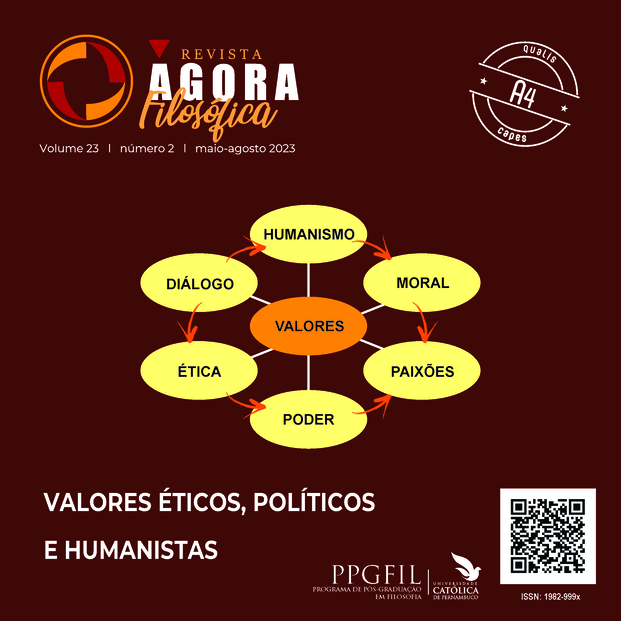The politics of passions as a foundation of political engineering of the rule of law: a study of Albert Hirschman's hypothesis
DOI:
https://doi.org/10.25247/P1982-999X.2023.v23n2.p120-143Keywords:
Medieval imaginary, Modern imaginary, Compensatory passions, Modern stateAbstract
The article aims to investigate how the principle of compensatory passions, that is, the way of dealing with the passions that defend the conflict between them as a way of reaching a balance, contributed to the construction of the modern state of democratic matrix and liberal, recognized as the basis of the tradition of constitutionalism. Based on the bibliographical method, Albert Hirschman hypothesized in his essay "Passions and interests", that is, that the engineering of modern political power is based on the aforementioned principle; with the aim of showing a contrast between two world views on the way to deal with the passions, the historical aspect about the difference between the medieval and modern imaginaries about the passions was deepened. The justification of the theme is related to the importance of understanding the history of the relationship between politics, rights and affects in modernity.
Downloads
References
BOURDIEU, Pierre. O poder simbólico. Tradução de Fernando Tomaz, 2 ed. Rio de Janeiro: Bertrand Brasil, 1998.
BROWN, Peter. Corpo e sociedade: o homem, a mulher e a renúncia sexual no início do cristianismo. Tradução de Vera Ribeiro. Rio de Janeiro: Jorge Zahar, 1990.
ELIAS, Norbert. O processo civilizador. v. 2. Tradução de Ruy Jungmann. Rio de Janeiro: Jorge Zahar, 1993.
Hamilton, Alexander. O federalista. Tomo terceiro. Tradução Anônima. Rio de Janeiro: Typ. Imp. E const. De J. Villeneuve e COMP. Rua do Ouvidor. 1840.
HIRSCHMAN, Albert O. As paixões e os interesses: argumentos políticos a favor do capitalismo antes do seu triunfo. Tradução de Luiz Guilherme Chaves e Regina Bhering. Rio de Janeiro: Record, 2002.
HUIZINGA, Johan. O outono da idade média. Tradução de Francis Petra Janssen. São Paulo: Cosac Naify, 2013.
HUME, David. Treatise of human nature. Oxford: Clarendon Press, 1896.
LE GOFF, Jacques. O imaginário medieval. Tradução de Manuel Ruas. Lisboa: Editorial Estampa, 1994.
JEFFERSON, Thomas. Escritos políticos. Tradução de Leônidas Gontijo de Carvalho. São Paulo: Abril Cultural, 1973.
MONTESQUIEU, Barão de. Do espírito das leis. Tradução de Jean Melville. São Paulo: Martin Claret. 2007.
PANOFSKY, Erwin. Arquitetura gótica e escolástica: sobre a analogia entre arte, filosofia e teologia na Idade Média. 2. ed. Tradução de Wolf Hörnke. São Paulo: Martins Fontes. 2001.
SPINOZA, Benedictus de. Ética. Tradução de Tomaz Tadeu. Belo Horizonte: Autêntica, 2009.
SPINOZA, Benedictus de. Tratado político. Tradução de Norberto de Paula Lima. São Paulo: Ícone, 1994.
WEBER, Max. Ética protestante e o “espírito” do capitalismo. Tradução de José Marcos Mariani de Macedo. São Paulo: Companhia das Letras, 2004.
Downloads
Published
Issue
Section
License
Copyright (c) 2023 Danilo José Viana da Silva

This work is licensed under a Creative Commons Attribution 4.0 International License.
You are free to:
- Share — copy and redistribute the material in any medium or format for any purpose, even commercially.
- Adapt — remix, transform, and build upon the material for any purpose, even commercially.
- The licensor cannot revoke these freedoms as long as you follow the license terms.
Under the following terms:
- Attribution — You must give appropriate credit , provide a link to the license, and indicate if changes were made . You may do so in any reasonable manner, but not in any way that suggests the licensor endorses you or your use.
- No additional restrictions — You may not apply legal terms or technological measures that legally restrict others from doing anything the license permits.
Notices:
You do not have to comply with the license for elements of the material in the public domain or where your use is permitted by an applicable exception or limitation .
No warranties are given. The license may not give you all of the permissions necessary for your intended use. For example, other rights such as publicity, privacy, or moral rights may limit how you use the material.
















